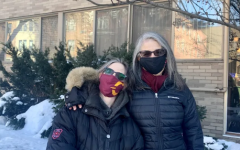The National Federation of the Disabled - Nepal (NFD-N) is an umbrella organisation that advocates for the rights, interests and entitlements of people with disabilities across the country. With more than 300 member organisations in 74 districts, NFD-N is the leading disability rights movement in Nepal – and the centre of countless views of a variety of people with different abilities, opinions and hopes. Pawan is a man in his thirties with a physical disability and works with NFD-N at the provincial level and Rashmi is the mother of a young girl with a physical disability living in Kathmandu. The following interview reflects some of the many responses that Light for the World received to its call for input on the current situation around COVID-19 in Nepal.
Question: How would you describe the current situation related to the COVID-19 vaccination in Nepal? Are you aware of any plans to ensure the prioritisation of people with disabilities?
Pawan: Nepal started to provide vaccines to its citizens on Wednesday, 27 January 2021, with health workers as the first target group. By the end of February, about 9,000 people have been vaccinated in 93 immunisation centres in 64 districts. The government has announced to continue with elderly citizens and teachers in a second round.
Rashmi: I have seen journalists, bankers and other people with power queueing in front of immunisation centres to get their vaccination early. I’m worried that people with disabilities will be overseen for many more months.
Question: Have you already received a vaccination? If so, how would you describe your experience?
Pawan: I did, and I was quite surprised that both the information during the registration process and the venue itself were accessible to people with a physical disability like me. I felt well informed and agreed to get vaccinated.
Rashmi: See, this is exceptional. I, personally, do not feel well enough informed to make my decision. There are rumours that current vaccines might lead to some irreversible health impact. There is just not enough accessible and understandable information available. Even within NFD-N (National Federation of the Disabled – Nepal), we have not yet received much information about the process and the vaccine itself.
Question: There is a lack of accessible information on the COVID-19 vaccines, leading to mistrust and fear. What are other barriers you think may prevent you and other people with disabilities to access vaccination?
Rashmi: The lack of accessible information originates from the lack of recognition of people with disabilities. Government officials, the media, the public, even people with disabilities themselves often do not recognise the vulnerability of and increased risk experienced by people with disabilities during this pandemic.
Pawan: And this further leads to hesitance on behalf of Organisations of Persons with Disabilities (OPDs) and self-advocates to publicly call for prioritisation in national vaccination plans. It is difficult to know whom to address with our claims or even to inform about our needs or offer support. Responsibilities and accountabilities are not communicated clearly. We have started to advocate at the provincial and community level, however, this is not enough.
Question: With the COVID-19 pandemic going on and all you hear about vaccination, what are your concerns and hopes for the future?
Pawan: For the near future, I hope that our government will prepare comprehensive information about the available vaccines in an accessible format and distribute it widely. This step is necessary to live up to Article 21 on access to information in the Convention to the Rights of Persons with Disabilities: Everyone needs to have the chance to form a free and informed opinion regarding the vaccination.
Rashmi: I sincerely hope that the available vaccines are safe and that they will further be made available to all people. People with disabilities with high support needs, including their personal assistants, need to get the vaccination first, followed by other groups of people with disabilities. We must remember and shout out loud that nobody should have to go through (?) this pandemic alone – we are all in this together.
>>Learn more about Persons with Disabilities and Access to COVID-19 Vaccination here.
>>Read more stories on experiences of persons with disabilities amidst the COVID-19 pandemic here.

